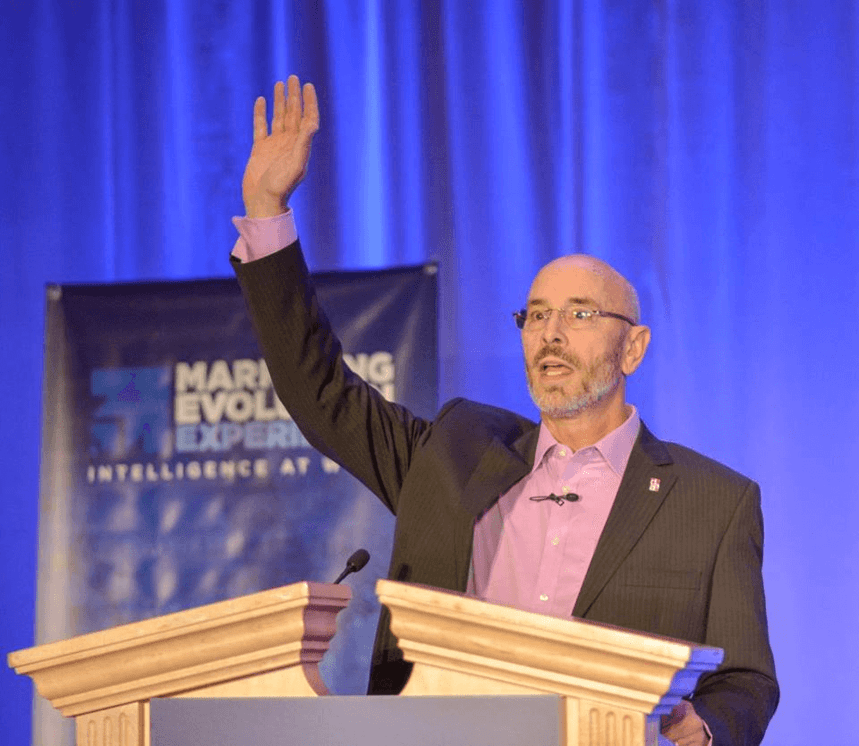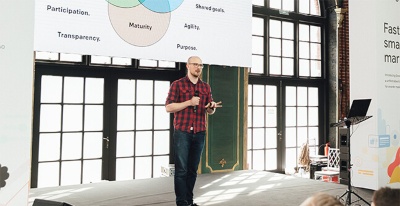OWOX BI research on the state of digital analytics: Jim Sterne interview
Mariia Bocheva, Business Development Executive @ OWOX
Olha Diachuk, Creative Writer @ OWOX
Jim Sterne is the Founder of Marketing Analytics Summit (formerly eMetrics Summit), Director Emeritus of the Digital Analytics Association, author of 12 books, a talented speaker, and an overall great person and specialist.
Mariia Bocheva had the pleasure of meeting Jim at Marketing Analytics Summit in Las Vegas in June 2019, a few months after this interview happened. Mariia has already published full reports on the first and second days of this conference.
Mariia’s interview with Jim covered the following themes:
Analyst’s skills
Mariia Bocheva: What soft skills should a good analyst have?
Communication is key: talking to people in meetings, giving PowerPoint presentations, sharing dashboards. This could be called a hard skill, because it’s so necessary, but actually it’s a people skill, so it’s a soft skill.
MB: What hard skills are most important for analysts today?
JS: When we talk about hard skills, first we talk about data itself – data collection, cleansing, building a pipeline. Essentially, the data engineering side. If you’re happy to work in a company that’s large enough to have data engineers, you don’t have to do these things.
What is a necessary hard skill is knowing where the data comes from. How is it processed, preprocessed, and integrated before you get your hands on it? You have to understand the raw material.
Another one that I see is statistics. It’s absolutely not necessary to be a statistician, but it’s very important to understand statistics in general so you can apply the concepts. Hard skills include knowing your tools. As Adam Greco says: “The more you know your tools, the more options you have, the more abilities you have.”
Finally, if you want to go deep, study R or Python depending on what you are more interested in – statistics or machine learning. Again, it’s absolutely not necessary but very helpful.
MB: Does an analyst have to know SQL, Python, and R and build compiled dashboards?
JS: It really depends on many factors. If I have a team of one hundred analysts, then maybe I don’t need people who know how to use SQL, Python, and R. On the other hand, it never hurts.
Do I have to be an expert coder? NO. But do I have to understand what is going on and what happens behind the scenes? YES.
It’s useful to know how TCP/IP works, it’s useful to know how HTTPS works, it’s valuable to know how coding happens. Whether it’s absolutely necessary depends on your team.
If you are the only person who works with SQL, you have to become better at it because you are the only one. But if you have a whole team of SQL experts, you don’t need to be; but you should understand what they are talking about so you can ask good questions.
A plumber doesn’t need to know how a copper pipe is made, but if he does and then comes across some weird problem, he can say, Oh, that’s a problem in manufacturing. Because he has this extra knowledge. So is it necessary? No, but it’s always useful.


Power of communication
MB: Do you think miscommunication between analysts and marketing teams is common? If yes, do you have any recommendations on how to overcome it?
JS: Yes, it’s very common. The recommendations are about cross-training. I was giving a presentation (maybe 15 years ago in Germany) explaining what an analyst does and how the analyst’s job is to help people in the company do their jobs.
It’s important to understand what other people are trying to accomplish. Then somebody in the audience raised his hand (it’s unusual for this type of audience) and asked, Do I have to understand all other jobs in the whole company? And I said YES! That’s true, that’s your job. It’s good to know what people are trying to accomplish to help them, but it’s also good having them understand enough about data.

I have an example of cross-training in analytics across departments. When David Rhee was working at Adidas, he decided his team needed to increase their skills. So he rotated them through different responsibilities. He would take an email analytics person and put them in charge of display; put a display person in charge of social media metrics and then put them in charge of web metrics. During the year, he was rotating people. So if you were there for 3 or 4 years, you learned how to do everything.
And while my instant reaction is, Oh my god! I have to start all over! I spent a year learning this stuff and now you’re just gonna throw me into the cold water and I have to learn how to swim again, his answer was yes, you have to. And as a result, the whole team got to know what everybody else was doing. So when you have a decision to make, you make it from the organization’s perspective rather than I’m in charge of email. This can help the whole department. And I think this methodology can work the other way.
When somebody came in and said, I’ve been offered a better job with someone else in the middle of the company, David would encourage and support them because he’d say, you know, in two or three or five years from now you’ll come back to work for me and you’ll be smarter because you’ve learned new stuff.
If we apply that to the difference between analytics and marketing, an analytics person can spend a day a month just following around one of their analytics clients, hanging out with the email marketing people, hanging out with the social media metrics people, watching what they do and how their day looks. That would be valuable.
MB: What knowledge are analysts and marketing specialists missing in order to make companies data-driven?
JS: For analysts, it’s domain knowledge and knowing the goals of other people. And for marketers, it’s how to apply data. Communication is just about knowing what the other person’s goals are and what their struggles are. And that’s true in any relationship – it doesn’t matter if it’s business or personal.
It’s called empathy, and it requires knowledge of the other person’s situation.
MB: What’s the biggest mistake an analyst can make? Can you share some of your analytical mistakes?
JS: The biggest mistake is thinking that analyzing data is enough. It’s not because it’s only a part of the whole business ecosystem. Understanding the goals and challenges, politics and limited resources of the whole ecosystem is very important.
I guess the easiest answer about my own mistakes is the most common mistake I make, which is assuming the data is clean and trustworthy. When you work a lot, it’s very easy to forget that something might not be true.
MB: What are the most important things analysts need to do at different stages of business maturity (startup, SMB, SME, enterprise)?
JS: The first thing you have to do is have enough data. If you are a startup, you have no data. That’s a problem. If you are a small company, you have very little data, which is also a problem.
If you are a medium-sized or enterprise company, you have data but you have no infrastructure. Once you have data, you need tools and the skills to use those tools. And your tools and skills must be sophisticated enough to provide value.
And if you’re large enough and you have data sources, then you need to automate things like building dashboards or actually automate marketing decisions and operations. The biggest challenge is making changes coming out of this data applicable to real situations.
Get everybody to believe in data. I’m not sure that possibilities of analytics systems really depend on the size of the company but on the maturity of the company and available resources.
Thoughts about the present and future of marketing analytics
MB: What difficulties do you see when it comes to implementing analytics and how would you assess the overall development of the market?
JS: The biggest challenge is getting everybody working in the same direction. It’s organizational capability. If I’m an analyst, I love data and I want everybody to love data. It’s a big job to convince the company that it’s a good thing. It’s a very common problem that a company loves data or says they do but they only use it to confirm their own opinions or they use it badly.
The most common problem is using data poorly through misunderstanding and a human desire to show themselves that they are successful.
MB: How do you evaluate the current maturity of marketing analytics?
JS: I think we have more technologies than we know what to do with. Back in 2005, Avinash Kaushick taught us that when you spent $10 on analytics, you spent $9 on people and $1 for technology, and we’re still there. There are really smart people creating really incredible technologies. And it’s a little bit beyond our ability to use it all.
Imagine having a system that collects all information, cleans it, lumps it all into some central repository, and makes many decisions. By showing the right message to the right person at the right time, you make more sales, your customers are happier, and such an approach is always less expensive. It would be great if it could work. But getting all of the pieces to work together means you have to use a lot of technology, and all of those different tools you need to use are getting more and more complex every day.
So I need 15 different tools, and I have to be an expert with all of them to make them all work great. You can spend three hours working with one tool, and then somebody changes something – there’s a new version of a tool, somebody mislabeled a link, or something goes wrong. So we have 15 minutes of perfection and then we spend the rest of our lives trying to get it all to work together.
MB: What do you think is the future of marketing analytics? What trends do you see coming and what’s in high demand?
JS: Well, my latest work is machine learning. So that’s my answer ;-)
It’s just different kinds of software, but it’s still software and it’s getting things done. So the specialist should see when it’s appropriate to use that tool to solve this problem and when it’s overkill as it’s too expensive or too complicated.
What’s important is knowing when to use the right tool. Sometimes, Excel spreadsheets are great; sometimes, simple statistical regression is enough; and sometimes, okay, let’s spin up some machine learning system to try to solve this problem or automate this thing. Knowing the difference is the value the analyst brings to the table.
MB: What professional resources or events can you recommend for analysts?
JS: The most important event is the one that’s nearest to you and that you can afford. Because it’s not a good event if you can’t get there. The next most important one is where you can run into people you know, because that’s how you build your professional network.
I like going to DAA Hub in Virginia, which is great for a deep dive with people that have been doing analytics for a long time. If you are very serious about your career, you should go and buy a ticket. I can say the same about Superweek. That is a place where really smart people talk about really complicated things in a fascinating way.
On the other hand, MeasureCamp is an exciting community. The last time I did MeasureCamp was in Bratislava, Slovakia. I can say that every MeasureCamp I’ve been to has the same attitude. It’s really interesting: people are trying to solve very straightforward problems and everyone is trying to help each other. That just makes me feel so good.
And I guess I really should mention my very own Marketing Analytics Summit! There are several coming up in Europe and the main event is in Las Vegas in June.
I always point people to join the DAA association, which is already 15 years old and has 5,000 members. I’d also like to point people to the Digital Analytics Power Hour podcast. I would recommend going back and listening to all of the episodes.
And then, of course, Measure Slack. We used to connect on email discussion lists. Then there are different blogs where people actively engaged. Then there was a lot of activity on Twitter with the hashtag #measure. If you have a problem, question, or joke or you just have to get your head out of numbers for a minute and communicate with humans. Today, the conversation seems to be on Measure Slack and it is awesome.
The last thing I’d like to add is about the #measure culture. People like to help each other. Our industry is all about sharing. We’ve been helping each other for many years. That’s why all those events are so valuable; we’re people who like to help, share, and learn.
OWOX BI conclusions
We thank Jim for such encouraging and fresh thoughts. We hope you enjoyed this interview and got as great of an inspirational boost as we did. Love your job and your analytics community and never stop developing yourself!
Subscribe to our blog to read the next interviews as part of our research into the state of digital analytics and adapt the experience of top analysts to your business.








